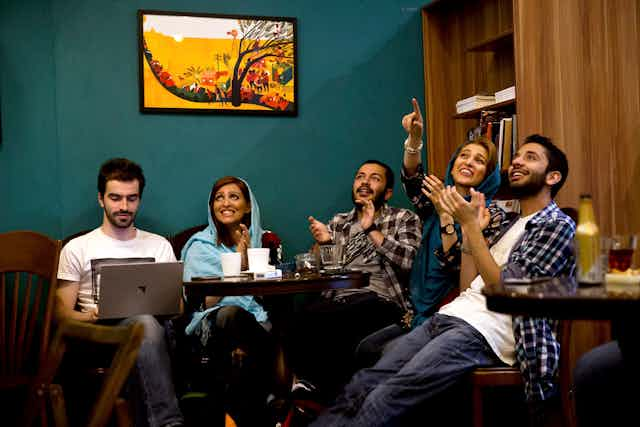IMAM KHOMEINI’S MAUSOLEUM AND IRAN’S PARLIAMENT COME UNDER ATTACK
This was a headline on a breaking news story published last month by Press TV, an Iranian online news publication. The news spread like wildfire through Telegram — a very popular digital platform for Iranians — as people shared pictures and videos of the event as quickly as the internet allows. The attack, which left more than a dozen people dead, was considered the first ISIS-associated atrocity to shock the citizens of Iran.
Iranians, Canadians and the rest of the world have since been asking the question: Are Iranians now going to suffer the same fate as those who are being terrorized by ISIS in Iraq, Syria, Afghanistan and even Turkey? Iran’s neighbours, after all, are often in a state of chaos caused by extremists.
The factors contributing to both Iran’s national fragility and its strength in the face of terrorism are varied and multiple. As someone who’s extensively studied the region, I’m going to concentrate on the factor of ethnicity. First, however, let’s start with some background on ethnicity in the aforementioned countries, and then examine Iran’s.
Iraq
From its inception as a modern state in 1921, Iraq proved to be incapable of stemming the expansion of racial and ethnic divides throughout the country, and the unfortunate result is fractured political and territorial unity. Ethnic tensions are boiling over particularly in Kirkuk, a city located in northern Iraq. The rivalry between Kurds and Arabs for supremacy over Kirkuk created a zone of conflict in Iraq, which has resulted in some observers arguing that we should put to rest the idea that Iraqi, as a national identity, even exists.
Turkey
The same ethnic clashes present in Iraq occur in Turkey. Many studies have delved into the long history of conflict between Kurds and Turks, suggesting that Kurdish minorities have been systematically discriminated against by Turkish citizens and the Turkish government alike. It’s this ethnic tension that provided the breeding ground in which the Kurdish Workers’ Party (PKK) mobilized Kurdish ethnics for armed confrontations against the government of Turkey.
Afghanistan and Pakistan
Ethnic conflict is even more salient in Afghanistan and Pakistan. The citizens of both countries have been terrorized by a series of carnages as ethnic tension continues to spur panic and destruction. Today, Pakistan is plagued by bloody combat and the subsequent thirst for vengeance among Punjabi, Balochi, Pashtu and Sindhi communities. In Afghanistan, so-called Federally Administered Tribal Areas, consisting of the seven tribal communities of Bajaur, Mohmand, Khybar, Orakzai, Kurram and North and South Wazirestan, are rife with ethnic tensions.
Ethnic conflict in Iran: myth or reality?
Now, with the benefit of perspective regarding links between ethnic strife and national fragility, it’s clear that ethnic clashes stand out as one of the key factors behind the spread of terrorism. This opinion is in line with a number of social/political studies that have found that countries plagued with ethnic conflict are more likely to serve as host to the cancerous growth of terrorism.
And so is Iran’s ethnic situation going to spawn more terrorism, and put Iranians at risk of being routinely terrorized by extremists just as their neighbours are? A close look suggests that the answer is no.

That’s because the status quo of ethnicity in Iran is distinct from its neighbouring countries. Iranians of different ethnic backgrounds define themselves not so much by how they differ from Iran’s national identity, but by what they have in common. Ethnic groups in Iran aren’t treated as non-Iranians, nor as those that were annexed by Iran; historically, they’ve been associated with different geographic regions within the country.
Different Iranian ethnicities living in different isolated communities aren’t excluded from the process of national identity formation. They share values and common social will that unite Iran’s local identities under a national one. And the state power in Iran has never been greatly contested by the different ethnic groups.
And so it’s reasonable to conclude that it’s unlikely there will be a dramatic uptick in terrorist activity in Iran that would be capable of mobilizing the country’s ethnic groups. The voter turnout of different ethnicities in the recent presidential election — (Turks of East Azerbaijan: 69.6 per cent; Kurds of Kurdistan: 59 per cent; Blushes of Sistan and Baluchistan: 75 per cent; Lors of Kohgiluyeh-Boyer-Ahmad: 72 per cent) — also makes clear that ethnic groups are not fractured, atomized or disconnected. Rather, they’re politically engaged in their country.
Whether more bombs go off in the streets of Iran depends on the efficacy of security measures following last month’s attacks. But it’s improbable that terrorism is going to fester among Iran’s ethnic groups, or destroy the country’s ethnic harmony.

